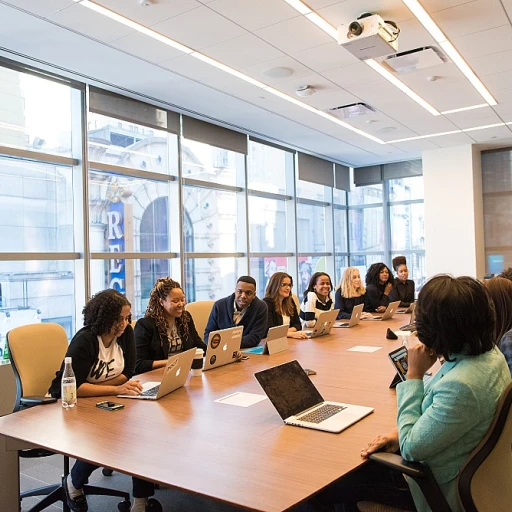The Role of AI in HR
Harnessing AI for Human Resources
Artificial Intelligence (AI) is revolutionizing the field of Human Resources (HR), offering transformative solutions that enhance efficiency and advocate for inclusion within organizations. From recruitment processes to inclusive education initiatives, AI equips HR professionals with tools to create more equitable workplaces. AI algorithms are increasingly utilized to identify patterns and biases, allowing HR teams to make data-driven decisions that promote diversity. By analyzing massive datasets, AI can highlight areas needing attention, such as ensuring inclusive education for employees or providing supportive services that cater to unique individuals. This technology serves as a powerful advocate, promoting the hiring of individuals from diverse backgrounds through more objective evaluation criteria. Consider how AI-driven platforms facilitate education for children by assessing learning patterns and tailoring educational content to student needs. Similarly, in a corporate context, AI enhances the skill development of employees by customizing learning experiences based on individual progress and performance reviews. This level of personalization ensures all employees, including those with developmental disabilities, receive necessary opportunities to learn and grow, fostering a truly inclusive environment. Furthermore, AI helps organizations uphold privacy by implementing robust privacy policies in HR practices, protecting sensitive employee information. AI-driven tools offer comprehensive reviews and feedback mechanisms, helping HR teams maintain compliance with privacy regulations while capturing valuable insights for continuous improvement. To understand more about how AI powers diversity and inclusion in HR, you can read about the impact of diversity hiring techniques. This evolving landscape indicates that organizations leveraging AI not only benefit from increased operational efficiency but also witness positive outcomes in areas like inclusion and mental health services. Throughout this blog post, exploring various aspects of AI-driven HR solutions will highlight the integration of AI as a cornerstone for advocating inclusion, promoting an environment where every employee, student, and individual thrives. This technology offers supportive pathways for workforce management and care initiatives, ensuring equitable opportunities for all.AI Tools that Advocate for Inclusion
AI Tools Enhancing Diversity and Inclusion Initiatives
Artificial intelligence is transforming various facets of human resources, especially when it comes to promoting diversity and inclusion. Tools powered by AI are significantly bolstering efforts to create more inclusive environments by offering innovative solutions to common challenges that organizations face. AI tools are robust advocates for inclusion, incorporating advanced algorithms that help identify and eliminate biases in recruitment processes. These tools assess candidates based on skills and competencies, rather than potentially biased factors that can arise from traditional hiring methods. They also enable organizations to incorporate inclusive education principles by focusing on diverse candidates, including those from unique backgrounds, schools, and educational contexts. Organizations and schools are leveraging AI to enhance their inclusion efforts. For instance, in the field of education, AI is being utilized to provide personalized learning experiences for students with developmental disabilities. This technology offers supportive learning environments where each child can learn at their own pace by tailoring the content to the individual student’s needs. This approach not only supports the children, but also aids educators in creating more inclusive classrooms. Moreover, AI tools can track and monitor the progress of various inclusion programs within the organization, ensuring that the initiatives are yielding positive outcomes. By analyzing social and developmental data, AI helps in offering services and care that are tailored to the needs of diverse individuals and groups. For organizations in places like Boise or Nampa, this means strengthening community ties and promoting inclusive health care and mental health services with greater efficiency. While AI streamlines many aspects of advocating for inclusion, it is also imperative to regularly review these systems to ensure they align with the organization's values and privacy policies. Advocacy groups and inclusive organizations must remain vigilant, adopting a proactive approach to overcome challenges and maximize success in fostering diversity. Implementing AI-driven tools is just one part of the broader movement toward inclusive workplaces and societies, as it creates opportunities for individuals from all walks of life. As AI technology evolves, it will continue to play a crucial role in fortifying the principles of inclusion and equity in both the corporate and educational sectors.Challenges in Implementing AI for Inclusion
Overcoming Obstacles with Thoughtful Implementation
Implementing AI to foster inclusion in the workforce can certainly be a transformative endeavor, yet it is not without its challenges. Organizations seeking to leverage AI must navigate a complex landscape that includes technical, ethical, and cultural hurdles.
One primary challenge is the risk of reinforcing existing biases rather than eliminating them. AI systems learn from historical data, and if this data reflects existing biases, the AI may perpetuate them. For instance, if the AI is trained on data where certain demographic groups are underrepresented in leadership roles, it may continue to undervalue candidates from those groups in future analyses. Therefore, it is crucial for companies to carefully vet and pre-process their data to ensure it supports diversity and inclusion. Enhancing candidate matching with AI can assist in mitigating such biases by providing refined algorithms.
Cultural resistance also poses a significant barrier. Employees and management may be skeptical of AI technology, fearing job displacement or misunderstanding how AI works. To surmount this, organizations can focus on education and communication. By implementing inclusive education initiatives, companies can demonstrate how AI can serve as advocates for promoting social change and improving mental health and overall well-being.
Additionally, privacy and security concerns regarding sensitive employee information must be adequately addressed. Organizations need to establish a robust privacy policy, ensuring that AI systems comply with relevant legal regulations and effectively safeguard personal data.
Furthermore, AI-powered tools may require substantial changes in organizational processes or workforce structures. Balancing technological advancements with the unique needs of individuals within the organization is essential for achieving positive outcomes. Companies should be prepared to invest in the necessary infrastructure and training to support both the technology and their employees.
Finally, it’s important to involve all stakeholders, including management, employees, and external advocates for inclusion, in the implementation process. Gathering diverse perspectives helps ensure AI systems are aligned with the organization's values and goals, contributing to a more inclusive future.
Case Studies: Success Stories
Real-World Impact of AI in HR
In recent years, the integration of artificial intelligence in human resources has brought about significant changes in how organizations advocate for inclusion and diversity. Several case studies highlight the success stories of companies leveraging AI to create more inclusive workplaces.
One notable example is a global tech company that implemented AI tools to enhance its recruitment process. By using AI-driven platforms, the organization was able to eliminate biases often present in traditional hiring methods. This shift not only improved the diversity of their workforce but also ensured that unique individuals with varied skills and backgrounds were given equal opportunities.
Another success story comes from the education sector, where schools have adopted AI to support inclusive education. AI tools help identify students with developmental disabilities early on, allowing educators to tailor learning experiences that cater to each child's needs. This approach not only fosters an inclusive environment but also ensures that all children learn effectively, leading to positive outcomes in their educational journey.
In the healthcare industry, AI has been instrumental in offering supportive services to individuals with mental health challenges. By analyzing data, AI systems can provide personalized care plans, ensuring that each person's unique requirements are met. This has been particularly beneficial in places like Boise and Nampa, where health care providers are committed to advocates of inclusive health care practices.
These examples illustrate the transformative power of AI in promoting diversity and inclusion across various sectors. As organizations continue to embrace AI, they not only enhance their operational efficiency but also foster a culture of inclusivity that benefits both employees and the community at large.
Ethical Considerations and Bias
Addressing Ethical Concerns and Bias in AI
As AI becomes a pivotal tool in human resources, particularly in fostering inclusion, it's crucial to consider the ethical implications and potential biases that may arise. AI systems are designed by humans, and as such, they can inadvertently reflect the biases present in society. This can be particularly concerning in HR, where decisions impact individuals' careers and livelihoods.
One of the main concerns is how AI systems handle data related to inclusion and diversity. These systems must be trained on diverse datasets to avoid reinforcing existing biases. For instance, if an AI tool is used to screen candidates, it should be able to recognize and value diverse skills and experiences, ensuring that unique individuals are not unfairly excluded.
Moreover, privacy policy and data protection are paramount. Organizations must ensure that sensitive information, such as mental health data or developmental disability status, is handled with care and in compliance with regulations. This is particularly important when AI systems are used in schools or educational settings, where children learn and develop.
Ensuring Fairness and Transparency
To advocate for inclusive practices, AI systems must be transparent in their operations. This means providing clear explanations of how decisions are made, allowing individuals to understand and challenge outcomes if necessary. Transparency helps build trust and ensures that AI is a true advocate for inclusion.
Organizations should also conduct regular reviews of their AI systems to identify and address any biases. This involves collaborating with diverse teams and external experts to gain a comprehensive understanding of how AI impacts different groups. In places like Boise or Nampa, advocates for inclusive education and health care can offer supportive insights to improve AI systems.
Ultimately, while AI offers significant potential for positive outcomes in HR, it is essential to approach its implementation with a critical eye. By focusing on ethical considerations and actively working to mitigate bias, organizations can ensure that AI serves as a powerful tool for promoting diversity and inclusion.



